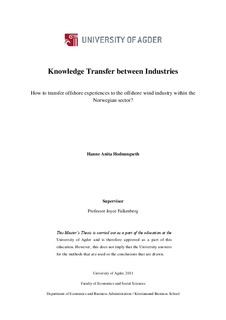| dc.description.abstract | Key concepts Knowledge, knowledge transfer, knowledge transfer between industries, experiences, offshore wind, offshore oil and gas, network
Background Norway has more than 40 years of experiences in offshore oil and gas. These experiences, together with experiences from shipping, maritime industry, concrete industry, cables, remote operations at sea and, meteorology represents a potential competitive advantage for the offshore wind industry.
Problem To be able to exploit the potential competitive advantage, the valuable knowledge needs to be available to the ones in position of taking advantage if it. Since most of the relevant knowledge lies within the offshore oil and gas industry, there needs to be a knowledge transfer from the offshore oil and gas industry to the offshore wind industry..
Purpose The main purpose is to identify how to transfer offshore experiences to the offshore wind industry. In order to answer this question, it needs to be defined how to transfer knowledge from one industry to another. The thesis will therefore aim to develop a suggested framework on knowledge transfer between industries. Knowledge transfer between industries will be defined to have taken place when industry A is affected by the experiences of industry B.
Research Methodology The research process will be qualitative. The main data collection will arise from six in-depth interviews. The respondents represents three different perspectives; the “sender” (industry A), the “receiver” (industry B), and an “outsider‟s” overall view. The interviews will focus on the following subjects; national competitiveness due to offshore experiences, what knowledge that is transferred / relevant to transfer, how to transfer knowledge from one industry to another, and why the “sender” should engage in knowledge transfer.
Findings A preliminary framework is suggested including the following factors; cross-industry network ties, career imprinting, cluster development, absorptive capacity, and cross-industry competition. Four of these factors were supported by the research; cross-industry network ties, career imprinting, absorptive capacity, and cross-industry competition. Cluster development was not supported. An “X” factor, cross-industry cooperation, was identified in the research process.
Conclusion The research showed that informal networks and formal cross-industry cooperation was especially important in terms of knowledge transfer between industries. This may be linked to the terms; trust, control and risk. | en_US |
